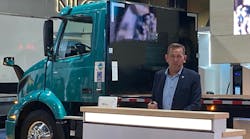VTNA’s Voorhoeve: 'Time to act now' for zero-emission trucks
LONG BEACH, California — At the start of the Volvo LIGHTS project, Volvo Trucks North America President Peter Voorhoeve thought the truck itself would be the bottleneck for widespread adoption of commercial electric vehicles. Over the last few years, however, VTNA and its 14 partners in the LIGHTS project found the biggest roadblock is the time it takes for a fleet to acquire a permit from a utility company to charge these vehicles.
“We found the charging infrastructure was the bottleneck, because all of a sudden, there were different demands on the utility company,” Voorhoeve told FleetOwner during ACT Expo 2021. “The shift toward electromobility and the shift toward zero emissions in transport will only work with good partnerships.”
Sticking with that theme of partnerships, during ACT Expo on Aug. 31, VTNA, Dependable Highway Express (DHE), SunPower Corp., and Kuehne+Nagel announced a new sustainable freight initiative to transport solar photovoltaics (PV) products using solar-powered Volvo VNR Electric trucks. DHE’s zero-emission, battery-electric Class 8 trucks will run warehouse distribution routes for SunPower from its facility in Ontario, California, where they are recharged daily by 100% renewable electricity generated by on-site solar panels.
“This sustainable supply chain collaboration with SunPower builds on the electromobility lessons learned through the Volvo LIGHTS project and demonstrates the growing market demand for carriers that operate battery-electric trucks, driven by shippers looking to decarbonize their supply chain,” Voorhoeve said.
In fall 2020, DHE became one of the first fleet operators in North America to deploy Volvo VNR Electric trucks, which have since been integrated into its daily freight transport routes throughout Southern California. This summer, DHE deployed three additional Volvo VNR Electrics and solidified its plans to take delivery of an additional 10 Volvo VNR Electric box trucks in 2022.
In addition, DHE installed more than 2,300 solar panels on the roof of its Ontario facility and employee parking canopies in 2020. Annually, the solar panels are expected to generate 1.291 GWh of renewable electricity—enough to power its building, the Volvo VNR Electric fleet, employee electric vehicle chargers, and battery-electric freight equipment.
DHE operates as a carrier in SunPower’s supply chain to deliver its solar PV products. SunPower, a solar technology and energy services provider, ships its products to various locations from Southern California.
“As a renewable energy company committed to doing the right thing, we have to consider the impact of our entire supply chain,” said Brian Campbell, VP of supply chain at SunPower. “In the face of today’s climate emergency, there is a collective responsibility to act now to lower carbon emissions and integrate sustainable transportation for solar and storage. We now help reduce dependence on fossil fuels from the moment our product leaves the warehouse.”
The collaboration between DHE and SunPower is managed by Kuehne+Nagel, which oversees transportation and logistics for SunPower’s products.
During ACT Expo, VTNA announced another partnership with warehousing and distribution company Performance Team, which was recently acquired by Maersk. Performance Team placed an order for 16 Volvo VNR Electric Class 8 trucks. When put into service, all 16 electric vehicles will carry regional loads daily across Southern California.
The El Segundo, California-based company operates a North America warehousing and distribution network of 45 locations and a fleet of 215 trucks.
“We’re seeing a 30% growth rate in our warehousing and distribution business,” explained Jason Walker, EVP of operations of Performance Team. “Customers are looking for more truck power to meet high volume delivery demands. This new order of Volvo VNR Electric trucks will give us firsthand experience on their performance carrying regional loads and environmental benefits. Our findings will help determine next steps in our fleet modernization and the electric infrastructure necessary for future operations.”
The purchase of the VNR Electric models is through Volvo Trucks’ dealership TEC Equipment, VTNA’s largest dealership on the West Coast. TEC Equipment is training its service technicians on the complete electromobility system and safety regulations and installing battery-electric truck charging infrastructure and specialty equipment in its maintenance bays. As part of the Volvo Gold Contract service and support package available with the Volvo VNR Electric, TEC Equipment will also support Maersk by providing maintenance, towing, and uptime services.
Time to 'act now'
During an ACT Expo fireside chat with Erik Neandross, CEO of Gladstein, Neandross & Associates, Voorhoeve explained that in order to meet companywide sustainability goals, by 2030, 35% of all VTNA’s vehicles will be electric, and by 2040 all company sales need to be 100% zero-emission vehicles.
Voorhoeve said these goals will be met using a three-pronged approach to mobility—via battery-electric vehicles, fuel cell electric vehicles, and, in some areas, internal combustion engines that run on fossil-free biodiesel.
“Electromobility is happening now,” he said. “For me, ACT Expo 2021 is act now, and that is what we are doing here [in California] with the VNR electric.”
Over the last two years there has been a snowball effect in terms of electrification, Voorhoeve explained. He pointed out that it’s not just the larger fleets taking the first steps toward electrification, but smaller and medium-sized companies are also taking that first step to transition their fleets to zero-emission vehicles.
“The incentive programs are such that they are achievable for everybody,” he explained. “We see a lot of smaller companies taking this as an opportunity to show that they have a sustainability agenda as well.”
Today, transport companies and manufacturers are convinced that they need to drive their business in a sustainable way, Voorhoeve noted.
“We see changes in customer relationships, and we are talking to people that we hadn’t talked to in the past,” he said. “That’s a very positive and very encouraging change in the last couple of years.”






